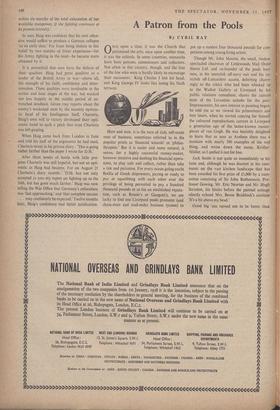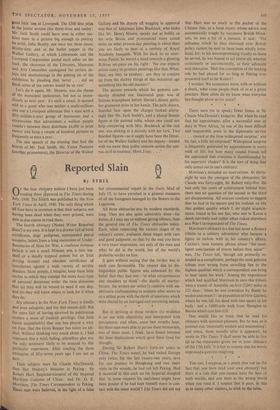A Patron from the Pools
By CYRIL RAY ONCE upon a time, it was the Church that patronised the arts; once upon another time, it was the milords. In some countries, monarchs have been patrons, connoisseurs and collectors. Not often in this country, though, and the fate of the few who were is hardly likely to encourage their successors : King Charles I lost his head, and King George IV looks like losing his Nash terraces.
Here and now, it is the turn of rich, self-made men of business, sometimes referred to in the popular prints as 'financial wizards' or 'philan- thropists.' But it is easier and more natural, it seems, for a highly successful money-maker, however intuitive and dashing his financial opera- tions, to play safe and collect, rather than take a risk and patronise. For every ocean-going-yacht flotilla of Greek shipowners, paying or ready to pay or squabbling with each other •over the privilege of being permitted to pay a hundred thousand pounds or so for an established reputa- tion, such as Renoir's or Gauguin's, we are lucky to find one Liverpool pools promoter (and chain-store and mail-order business tycoon) to put up a modest four thousand pounds for com- petition among young living artists.
Though Mr. John Moores, the small, rimless- spectacled chairman of Littlewoods Mail Order Stores Ltd. and co-founder of the pools busi- ness, in his unstylish off-navy suit and his un- stylish off-Lancashire accent, deferring charm- ingly to the critics who had been whisked up to the Walker Gallery at Liverpool by his public relations consultant, -shares the current taste of the Levantine nabobs for the post- Impressionists, his own interest in painting began, he told me as we viewed his prizewinners and best losers, when he started copying for himself the coloured reproductions current in Liverpool a generation ago of the better-known master- pieces of van Gogh. He was boyishly delighted to learn that as near as Arnhem there was a museum with nearly 300 examples of the real thing, and wrote down the name, Kroner- Muller, as I spelled it out for him.
Jack Smith is not quite so immediately to his taste and, although he was discreet in his com- ments on the vast kitchen landscape that has been awarded his first prize of £1,000 by a com- mittee consisting of Sir John Rothenstein, Pro- fessor Gowing, Mr. Eric Newton and Mr. Hugh Scrutton, his blinks before the painted acreage silently echoed Mrs. Bessie Braddock's cautious 'It's a bit above my head.'
Good big 'uns turned out to be better than
good little 'uns at Liverpool. The £500 first prize in the junior section (the thirty-fives and under : Mr. Jack Smith could have won in either sec- tion) went to a picture big enough to portray its artist, John Bratby, riot once but three times, Bratby-size; and at the buffet supper in the Walker Gallery, at which Littlewoods and the Liverpool Corporation patted each other on the back, the chairman of the Libraries, Museums and Arts Committee apologised for certain de- lays and shortcomings in the putting on of the exhibition by pleading that 'never . . did we think some of the entries would be so vast.'
Let's do it again, Mr. Moores, was the theme Of the municipal spokesmen, but not as imme- diately as next year: it's such a sweat. It seemed Odd to a guest who was neither a multi-million- aire nor a Liverpool alderman that a man with a fifty-million-a-year group of businesses and a corporation that administers a million people couldn't between them distribute £4,000 in prize money and hang a couple of hundred pictures as frequently as once a year.
The one speech of the evening that had the beards of Mr. Jack Smith, Mr. Victor Pasmore (another prizewinner), the Director of the Walker Gallery and his deputy all wagging in approval was that of Alderman John Braddock, who looks like Mr. Henry Moore, speaks out as boldly as his. wife Bessie and pronounced more sound sense on what present-day painting is about than you are likely to hear at a century of Royal . Academy banquets. With his back to an enor- mous Panini, he waved a hand towards a glowing Rubens set-piece on his right : `No one expects artists today to produce paintings like that. What, then, are they to produce : are they to conjure up from the shabby things of this industrial age something like the old masters?'
The picture towards which his gestures con- stantly directed our fascinated gaze was of Salome triumphant before Herod's dinner party, her gruesome prize in her hands. The pale, drawn, bearded face upon the charger looked alarm- ingly like Mr. Jack Smith's, and a plump female figure at the painted table, whom one could not help comparing with Mrs. Braddock at the real one, was picking at it daintily with her fork. Two bearded figures—as it might have been the Direc- tor of the Walker Gallery and his deputy—leaned with no more than polite concern across the can- vas, as if to murmur, 'Here, I say. . .



































 Previous page
Previous page